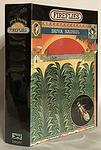Shiva Naipaul
Shiva Naipaul was a Trinidadian novelist and journalist, born on February 25, 1945, in Port of Spain, Trinidad and Tobago. He was the younger brother of Nobel Prize-winning author V.S. Naipaul. Shiva Naipaul is known for his sharp wit and critical eye, with works that often explore themes of cultural dislocation and the challenges of post-colonial societies. His notable books include 'Fireflies' (1970), 'The Chip-Chip Gatherers' (1973), and 'A Hot Country' (1983). He also wrote non-fiction, including 'North of South: An African Journey' (1978) and 'Journey to Nowhere: A New World Tragedy' (1981). Shiva Naipaul died at the young age of 40 on August 13, 1985.
Books
This list of books are ONLY the books that have been ranked on the lists that are aggregated on this site. This is not a comprehensive list of all books by this author.
-
1. Fireflies
This novel explores the complexities of post-colonial Trinidad through the lens of the protagonist's tumultuous family life and his arranged marriage. Set against a backdrop of societal change and personal disillusionment, the narrative delves into themes of identity, tradition, and the search for meaning in a rapidly transforming world. The protagonist's journey is marked by his struggle to reconcile his ambitions and desires with the expectations placed upon him by his family and community, ultimately presenting a poignant critique of the societal norms and cultural heritage that both bind and divide the characters. Through vivid storytelling and rich character development, the book offers a nuanced examination of the human condition within a specific cultural context.
-
2. The Chip Chip Gatherers
"The Chip Chip Gatherers" is a novel that explores the complex dynamics of a multi-generational Indo-Trinidadian family, the Khojas, living in Trinidad. The story revolves around the ambitions and struggles of the family patriarch, Egbert, as he attempts to rise above his impoverished beginnings and establish a successful life for his family. However, his efforts are constantly undermined by family squabbles, cultural tensions, and the harsh realities of post-colonial Trinidad. The novel provides a stark portrayal of the struggles faced by immigrants and the destructive power of envy and resentment within a family.

